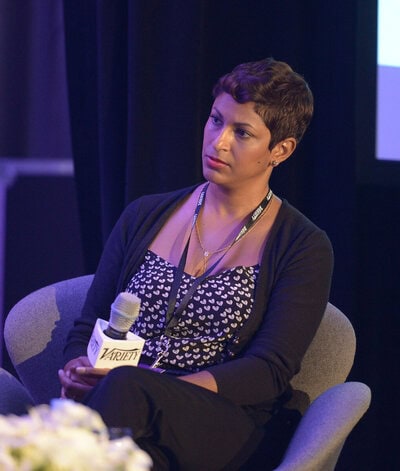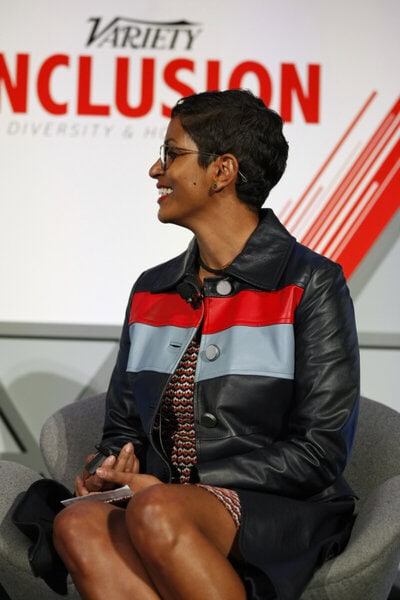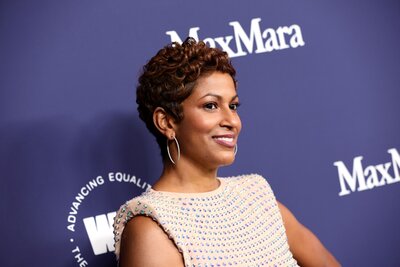Watkins serves as the President and Head of ColorCreative Management for multi-hyphenated mogul Issa Rae’s media empire.
Some of the most recognizable production companies have dominated entertainment for decades. While steadily churning out hit after hit, they’re slowly being rivaled by up-and-coming agencies yearning for similar success. HOORAE, for example, has only been around for three years, but projects from Issa Rae‘s media company have garnered the attention of permanent fans eager to consume more.
Even more importantly, HOORAE is an example of what happens when the Black community are allowed complete creative freedom to develop original stories rooted in excellence or relatable situations.
Proudly doing her part to facilitate the prosperity of a creator’s success is Talitha Watkins. The Jamaica-born, Maryland-raised exec is President and Head of ColorCreative Management under HOORAE. Founded by Rae and Deniese Davis, ColorCreative’s mission is to provide women and people-of-color creators premiere representation to build career-defining entities through ownership, commercial success, and visibility across the multicultural community and industry.
Watkins spoke with Boardroom about the joys of working alongside women, the importance of sharing Black stories, and why ownership over your own content is extremely vital in film, television, and other artistic verticals.
VINCIANE NGOMSI: What were some of the calculated steps that you took in your meteoric rise to get to where you are now? What was the best piece of advice someone gave that you still hold onto often?
TALITHA WATKINS: I like to say that the through line is straight, but as you’re building, it’s very windy but when you look back, you’re like, ‘Oh, all of this stuff added up.’ The things that I consider to be crucial in building a career, like the one that I’ve had where I really truly believe I get to do exactly what I was put on this earth to do, is being really kind to people. A lot of social capital is wasted in our business because people are not purely understanding of whether you make someone feel good. If you really help someone out, they want to help you, too. I’ve spent a lot of my career building consensus, which for me is going in with the intention of hearing what everyone needs to be successful in finding the cleanest pathway on how to get there. By doing so, it’s made me a great marketer, a great rep, a great producer, a great mother, and a great friend.
I’ve been so lucky to have worked predominantly in female-led companies. I’ve always wanted to work for great leaders, but I’ve also been able to work for great female leaders. I work with one now, which is amazing, but I’ve always heard to be nice to people at the very beginning of their career because those same individuals could be the people who are giving you an opportunity later on in life.

One of the first things I did when I changed industries from TV to film was I made sure to get to know all the assistants of all the executives I would be doing business with. I now can look on my social media and see, ‘Oh, so-and-so’s assistant is now a great event planner or planner in Napa. I’m going to suggest her to my friend who’s getting married there. Oh, this person is now running digital marketing at another company.’ It’s been so incredible to have made an authentic connection with people at the beginning of their careers and to be able to see what they’ve been able to do as we all have journeyed through this business.
VN: You talk about working with mostly women throughout your career. Was that just coincidental, or was an army of women around you something that you desired?
TW: My very first job in the industry was working for a male leader. He was fantastic and recently passed away, unfortunately, but he was a very benevolent leader. He would bounce a basketball when he was on your floor, so you would know he was coming and could get yourself ready to have that interaction. I think what he was doing was priming everyone to be their best selves when he was around.
I found being in the cable business that there were a lot of female leaders, so I went on to work at Lifetime and the CEO was a woman. Up next was Telepitctures and the CEO was also a woman. I also worked with Donna Langley at Universal [Pictures] – she was the female chairman. All of those opportunities were just really purposeful for me. I wanted to be in places where I could see female leaders.
VN: You currently work alongside Issa Rae. Can you discuss more about the importance of working with someone who is very rooted in sharing Black stories and her hands-on approach to the operations of things she attaches her name to?
TW: I was a fan before I became a partner with her. I remember the first episode of “Awkward Black Girl” that I saw on YouTube and watching the trajectory. I remember being on the lot at NBC Universal and just being like, ‘Oh my God, that’s Issa Rae.’ At that time she hadn’t broken through into this massive celebrity, but there was something bubbling under the subculture that I was aware of. Because I could see her there, I knew something was coming. I’ve always had this incredible goodwill toward her because of how she created her business and the authentic stories she told. When she said on the Emmys [red] carpet she was rooting for everybody Black, I was like, ‘You know what, one thing about Issa, she stays on mission.’
She’s very disciplined, a natural-born leader, she is thoughtful and she’s relational in her leadership style. Issa wants to hear from everyone but can make a decision by herself. I love that she has such assuredness in her discernment. I’m really excited for what is to come from her ability to try and manage all these hats but also put all these people in these areas that are important to her. ColorCreative is the second company she formed after starting her production company. It has always been a number one pillar for her to give back and to show people that you don’t have to climb to succeed. You could build with those around you.
VN: When you say don’t have to climb to succeed, you mean she essentially recruited other people that didn’t have multiple years of experience or weren’t already in exec roles, right? Instead, they just needed the right endorsement by someone who genuinely saw talent in them.
TW: Yes, absolutely. Someone she could inspire a vision from them. She’s famous for saying, ‘Everyone worries about networking up, but we should all also think about networking across.’ And that’s what launched our Find Your People initiative.
VN: How does Find Your People function as a whole to propel the overall success of emerging creatives?
TW: This was the second company Issa created that was not a production company. She thought, ‘I see a need, I’m going to go and fill it.’ The company was started to create opportunities for people to gather and form a community around being creatives and connecting them with the people behind the scenes who actually make the projects. There are a lot of people who think: ‘I know what I want to do, but I’m not exactly sure how to execute it.’ Issa and Deneise Davis, our other partner, having formed such a strong working relationship by being symbiotic in idea execution, wanted to foster an event that would do that.

We’re trying to make these steps from one level to the next less opaque and give creators an opportunity to see what it takes so that they can then determine from a very early level, ‘Do I want to commit to this? Is this really what I want? Or am I more interested in another area of the business?’ It’s important that anyone who is a part of the Find Your People Program and everyone who we like to work with as a management production company have a sense of ownership for the projects we’re doing.
A key moment I’ve learned throughout my career in leadership is to be an owner, not a renter. Ownership is really important because it determines how much you pour into it. Yes, you can always measure the impact you’re putting in and we know that that is going to have an impact on what’s coming out, but we can’t dictate what the results are going to be. We just dictate what we’re pouring into it.
VN: Moving forward, what would be a goal for you during your time with HOORAE or any other project you attach your name to? Helping creatives gain ownership and recognize their value?
TW: Oh, 100%. There are 10 people on my team and I am always looking for the best way to foster collaboration with them all, and I’m starting to see some early signs of that with people working on projects together. I would love to see that replicated outside of our business as well, where we’re thinking more openly about how we can partner with different people to achieve ultimate diversity. We believe that all voices are welcome at the table. We’d even like to do business with non-diverse storytellers and that’s because we believe they’re part of our experience and we’re part of theirs. I think we’re just at the beginning; I think there’s so much more to do.
VN: So you’re confident in the future of the industry, as it pertains to diverse creators and the progression in seeing ourselves on-screen, exhibits, music festivals, etc?
TW: Yeah, I’m really confident in that because I’m confident in our ability to create stories. I believe that diverse storytellers are across every generation that has existed on this earth. Because of that, we are now getting an opportunity to showcase this thing that either made us the fun person at the dinner table at Thanksgiving or be the narrator whenever you came back from the club.

I believe content is king and queen, so I’m excited to be able to support creators and help diversify what our business looks like. Part of that pillar of transparency, ownership, and mentorship, is also defining what success looks like to each individual. I feel like we’ve peeled off this kind of golden parachute that people are aiming for at the top of the entertainment industry.
Now people are saying, ‘Well, why? What if we do it this way? What if we partner with this person? Why don’t we try this?’ That’s why I a lot of these media companies are investing in themselves and here at HOORAE and the ColorCreative and through Issa’s support, are able to invest in ourselves. I’m excited to see what that looks like, especially for Black women.